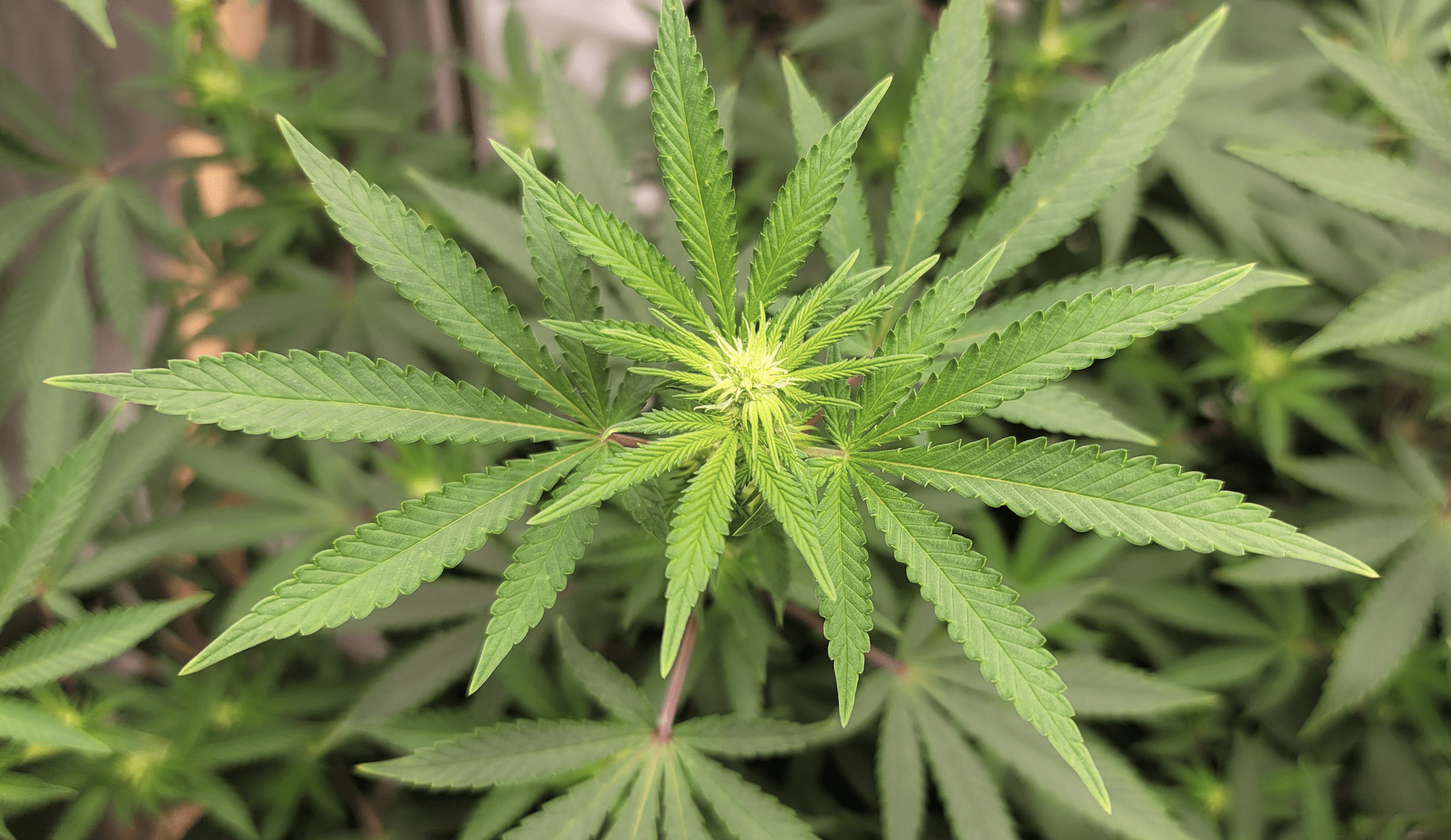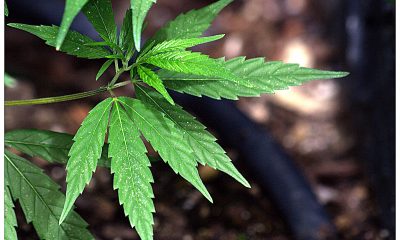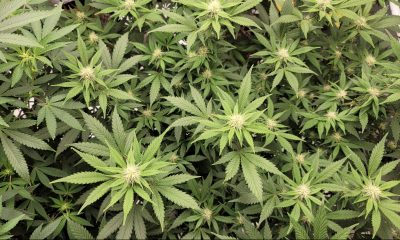Politics
Maryland Lawmakers Debate Bills To Protect Marijuana Consumers From Workplace Discrimination

Committees in both Maryland’s Senate and House of Delegates heard testimony this week on legislation that would protect workers from being penalized for off-duty marijuana use. If the legislation is enacted, employers would instead have to demonstrate that an individual was impaired while on the clock in order to fire them or take other adverse action.
The proposal would also bar companies from discriminating against people with prior convictions related to cannabis distribution.
On Thursday, members of the Senate Finance Committee heard SB 513, sponsored by Sen. Alonzo Washington (D). A day later, the House Economic Matters Committee took testimony on a companion bill with nearly identical language—HB 525, from Del. Jheanelle Wilkins (D).
While neither committee took action on the bill before it, they took hours of testimony from the bills’ sponsors, stakeholders and public commenters.
Washington, the sponsor of the Senate measure, said the proposal “seeks to safeguard Maryland workers from facing negative employment consequences due to their lawful cannabis usage.”
“This bill is designed to stop employment discrimination on the use of illegal substance that does not impair productivity,” he told the panel. “It prohibits the hiring discrimination for people who are formerly convicted relating to marijuana distribution and the firing of workers who test positive for cannabis use but are not unable to complete their tasks.”
Like Washington, supporters typically framed the proposal as a matter of common sense, noting that cannabis became legal in Maryland last year. Firefighter associations, for example, have generally come out in favor of the bill, arguing that members should be able to use marijuana on their off time without risk of retribution.
Skeptics, however, raised concerns about possible risks to public safety, with some business leaders arguing that the change would make it harder to identify and respond to impaired workers.
At Friday’s House committee hearing, Del. Jesse Pippy (R) said he was “shocked” and “taken aback” that firefighters would endorse the policy change.
“There could be a situation in which you have a first response who could be under the influence of cannabis, who’s in charge of keeping our communities safe,” he told representatives for firefighting associations who spoke in support of the bill. “You know, there comes a responsibility with being a first responder, police officer, other positions. Like I said, I’m a little in shock that you guys would be here in support of the bill.”
Wilkins, the sponsor of the House bill, responded that better assessing a person’s impairment on the job is a main goal of the proposal.
“That’s actually the specific purpose of the bill, is what you’re outlining,” she told Pippy.
“As long as they’re not impaired on the job, we’re working to protect our firefighters and our workers in their own time if they decide to utilize it,” Wilkins continued. “That’s actually the very purpose of the bill, is to protect that ability and to protect our workers.”
But critics said they’re not confident there’s a reliable way to assess a person’s impairment in a manner that would easily allow them to discipline workers who do show up while under the influence.
“Let’s use alcohol, for example,” Pippy said, “There’s a pretty reliable test in most cases where you can see if somebody is under the influence at that moment. With cannabis, you can’t.”
John Gardell, a fire captain in Pittsburgh, Pennsylvania, testified in support of the House bill on behalf of the International Association of Firefighters, which represents more than 300,000 members.
In May 2018, Pittsburgh began allowing firefighters to use medical marijuana to treat various conditions, Gardell said. “This policy did bring with it some of the concerns that you have heard or will hear today—more specifically, how an employer or supervisor will handle an employee who is unfit for duty regarding the use of cannabis.”
“Our experience over the last five years has shown that if we apply the same policies to cannabis that we have used for prescription medications, employees can benefit from its use and still be protected,” he said. “Regarding cannabis or prescribed medication, it is ultimately the first-line supervisor’s responsibility to determine an employee’s fitness for duty each and every day, as they have done with other substances. Since the inception of our cannabis policy over five years ago, not one incident has occurred within the bureau of fire in the city of Pittsburgh.”
“Cannabis unfortunately still suffers from a stigma,” Gardell continued. “Do not allow this stigma to prevent access to those that can benefit the most.”
Among dozens of speakers who testified over the course of both hearings, the panel heard from state officials, professional groups, business organizations, labor unions, policy groups, and and others.
NaShona Kess, executive director of the Maryland NAACP, called the bill “vital for communities of color and the working class, who have suffered from unfair employment practices, especially for nonviolent drug offenses like cannabis.”
“House Bill 535 isn’t just about employment rights. It’s about racial and economic justice,” she said. “It aims to ensure fair treatment for individuals in the workplace regardless of their cannabis use and breaks down barriers for marginalized communities.”
Cleveland Horton, deputy director for the Maryland Commission on Civil Rights, which is a state government body, said that group is also in favor of the bill.
“The purpose and intent behind this bill is more consistency around the application and creation around policy as it pertains to cannabis in the workplace,” Horton said. “What we’ve seen is inconsistent policies from employers, and through the use of House Bill 535, we’re hopeful that we’ll see more consistent action.”
“We also hope through the use of House Bill 535 that we will begin to eradicate the negative stigma associated with cannabis. We know that our society has evolved and now we do have the legal use of recreational cannabis,” he added. “We believe that our policies—and our employment policies in particular should also evolve in that area.”
On Thursday, the Senate panel also heard from cannabis reform advocates at NORML and the Marijuana Policy Project (MPP).
“This legislation protects civil liberties and it does not jeopardize workplace safety,” said NORML Deputy Director Paul Armentano. “Changes in the state legal status of cannabis do not adversely impact workplace safety or workplace performance. In fact, studies consistently show that employees who consume cannabis during their off hours perform no differently than their non-using peers. Specifically, an exhaustive review conducted by the U.S. National Academy of Sciences determined, and I quote, ‘There is no evidence to support a statistical association between cannabis use and occupational accidents or injuries.'”
Armentano also noted that the bill doesn’t prevent employers from testing workers for impairment.
“Employers would be free to utilize performance-testing technology like AlertMeter or Druid in the workplace,” he said. “This technology, unlike urinalysis or blood tests, engages employees’ actual cognitive impairment versus their own personal baseline, thereby providing a far more accurate determination of whether someone is actually impaired on the job. By contrast, urine testing only identifies inactive metabolites, which may be detectable for weeks or even months following cannabis use.”
Olivia Naugle, senior policy analyst at MPP, said testing for cannabis results in “completely sober, capable workers losing their jobs or not being hired for having used cannabis—which is a legal substance in Maryland—days or even weeks earlier.”
“Other states that have legalized cannabis for adults are increasingly acting to ensure workers don’t lose their jobs for using cannabis after work hours,” she said.
Cannabis-related employment policies have been a major topic across the country amid the marijuana legalization movement.
—
Marijuana Moment is tracking more than 1,000 cannabis, psychedelics and drug policy bills in state legislatures and Congress this year. Patreon supporters pledging at least $25/month get access to our interactive maps, charts and hearing calendar so they don’t miss any developments.
![]()
Learn more about our marijuana bill tracker and become a supporter on Patreon to get access.
—
As marijuana legalization began to take effect in Ohio last year, for example, Cleveland Mayor Justin M. Bibb (D) announced that the city had “modernized” its drug testing policies for applicants for city jobs, eliminating “antiquated language around pre-employment marijuana testing that has previously hindered hiring efforts.”
In California, meanwhile, two pieces of legislation signed into law in 2022 and 2023 took effect recently that prohibit employers from asking job applicants about past cannabis use and bar employers from penalizing workers over lawful marijuana use while off the job.
A new Washington State law that bars pre-employment drug testing for marijuana but nevertheless allows employers to fire workers for testing positive after they’re hired also took effect this year.
In Washington, D.C., a law went into effect in July that bans most private workplaces from firing or otherwise punishing employees for marijuana use during non-work hours.
Michigan officials approved changes to the state’s employment policy over the summer, making it so applicants for most government jobs will no longer be subject to pre-employment drug testing for marijuana.
New York also provides broader employment protections for adults who legally use cannabis during off-hours and away from work.
Job Corps, the national job training program for young people, also recently updated its drug screening policy for new arrivals to the program in an effort to prevent use during the program but avoid penalizing participants for past use.
An ongoing legal challenge in Jersey City, New Jersey, is also unfolding around drug testing for public safety workers. Specifically, city officials argue that new state policies allowing off-duty marijuana use by police officers could force Jersey City to violate federal law when providing officers with firearms and ammunition. A local police union has called the city’s claim “pure hogwash.”
Scientists said recently they’ve identified an alternative way to test for recent marijuana use that’s significantly more accurate than standard THC blood tests that sometimes misrepresent a person’s potential impairment depending on frequently they use cannabis. They’re now actively working to build on that research with an expanded study.
Late last month, Justice Department researcher said states may need to “get away from that idea” that marijuana impairment can be tested based on the concentration of THC in a person’s system, however, questioning the efficacy of per se DUI laws.
Ultimately, there may not be a way to assess impairment from THC like we do for alcohol, she said.
Photo courtesy of Mike Latimer.
















